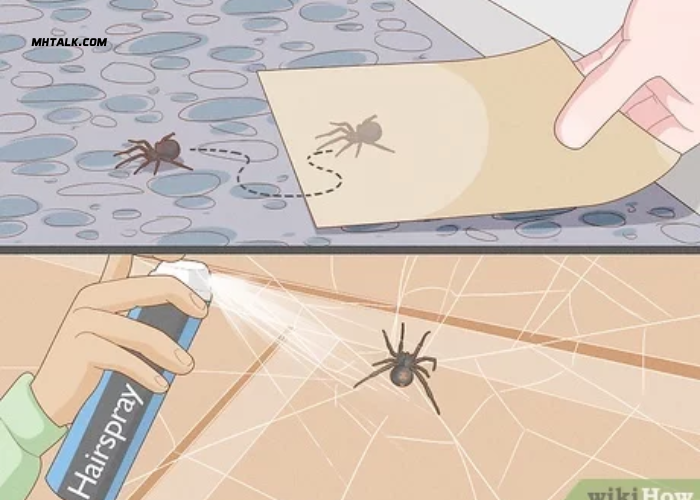Spiders, with their eight legs and intricate webs, have fascinated and often frightened humans for centuries. As a result, various myths and misconceptions have emerged about these arachnids, including whether alcohol can effectively eliminate them. The notion that alcohol can be used as a spider repellent or killer has gained traction, leading many to wonder if there’s any truth behind this claim. In this article, we will delve into the science and realities surrounding the question: Does alcohol kill spiders?
The Myth Debunked: Alcohol as a Spider Repellent
Alcohol and Arachnids: Separating Fact from Fiction
The belief that alcohol can repel or kill spiders has circulated through anecdotes and folk remedies. Some people claim that spraying a mixture of alcohol and water around their homes can deter spiders from entering.
The idea behind this approach is that the strong scent of alcohol might repel the arachnids, causing them to seek refuge elsewhere. However, there is limited scientific evidence to support this claim.
Research suggests that spiders are primarily guided by tactile and visual cues rather than olfactory signals. They might be less likely to respond to an alcohol-scented environment as a deterrent compared to other insects that rely heavily on their sense of smell.
In fact, spiders are known for their impressive sensory capabilities, and they are more likely to avoid areas based on physical obstacles or vibrations rather than chemical odors. Therefore, the idea of using alcohol as a spider repellent is more rooted in anecdotal accounts than in scientific validation.
Alcohol’s Impact on Spiders: Lethal or Ineffective?
The Lethal Effects of Alcohol on Spiders: A Closer Look
When it comes to using alcohol to directly kill spiders, the situation is a bit more nuanced. It’s true that alcohol, particularly in high concentrations, can be toxic to a wide range of organisms, including spiders.
Some people have reported success in immobilizing or killing spiders by directly spraying them with alcohol. However, there are several important factors to consider before attempting such methods.
Spiders, like many other insects, have an exoskeleton that provides protection to their internal organs. The exoskeleton acts as a barrier against external threats, including chemicals like alcohol.
While alcohol may be able to penetrate the exoskeleton to some extent, the effectiveness of this process depends on various factors, such as the spider’s species, size, and the concentration of alcohol used.
Research indicates that some spiders may be more resistant to alcohol’s effects than others. Spiders that have adapted to survive in harsh environments might possess a higher tolerance to toxins, including alcohol. Therefore, the efficacy of alcohol as a spider killer can vary significantly among different species.
The Ethical and Practical Considerations
Is Alcohol the Best Solution? Ethical and Practical Implications
Using alcohol as a spider repellent or killer raises ethical and practical questions. While it may be tempting to resort to chemical solutions to control spider populations, it’s important to consider the broader impact of such methods on the ecosystem.
Spiders play a crucial role in maintaining natural balance by controlling insect populations. They are natural predators that help keep nuisance insects in check, contributing to overall ecosystem health. Introducing chemicals like alcohol into the environment can disrupt this delicate balance, potentially leading to unintended consequences such as an increase in other pest populations.
Moreover, using alcohol to kill spiders might be less effective and more time-consuming than other methods. For example, vacuuming or physically removing spiders from your home is a more humane approach that avoids the use of potentially harmful chemicals. If a spider infestation becomes a concern, seeking professional pest control services is recommended for a safe and comprehensive solution.
Conclusion: The Verdict on Alcohol and Spiders
Weighing the Evidence: Alcohol’s Impact on Spiders
In conclusion, the idea that alcohol is a reliable spider-repellent or killer is largely a myth with limited scientific backing. While alcohol may have toxic effects on spiders, its efficacy depends on various factors, including species, concentration, and resistance developed over time. The use of alcohol as a spider repellent is questionable due to spiders’ reliance on other sensory cues for survival.
From an ethical and practical standpoint, it’s important to approach spider control with sensitivity to the broader ecosystem. Spiders play a vital role in maintaining ecological balance, and introducing chemicals like alcohol could lead to unintended ecological disruptions.
If you’re dealing with a spider infestation, it’s recommended to explore humane and effective methods, such as vacuuming, physical removal, or seeking professional pest control assistance. While alcohol might seem like a quick fix, it’s crucial to consider the potential consequences before resorting to such methods.
In the end, the idea that alcohol kills spiders is not entirely unfounded, but it is a complex and multifaceted topic that requires a more comprehensive understanding of spider biology, behavior, and ecological context. As we continue to unravel the mysteries of the natural world, it’s essential to approach pest management with both scientific knowledge and a sense of responsibility towards the environment.
Related posts
Recent Posts
InformalNewz: A New Era of Unconventional News Reporting
In the ever-evolving landscape of media and journalism, new platforms and approaches are constantly emerging to meet the demands of…
Balanced Living: Strategies for Achieving Wellness in a Hectic World
In today’s fast-paced world, achieving a sense of balance can often feel like an elusive goal. Juggling work, family, social…



